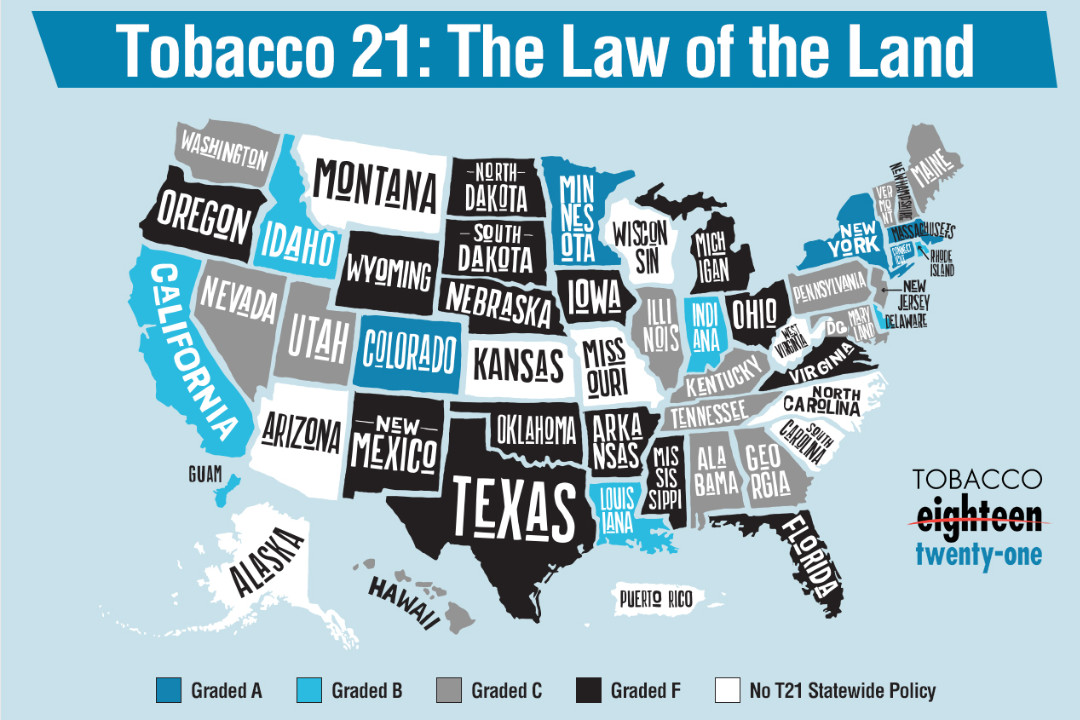QUICK LINKS
KEY TAKEAWAYS
- The legal age for vaping varies globally, with most countries requiring individuals to be at least 18 years old, while some set the age limit at 16 or 21 years.
- National regulations are based on factors such as health concerns, cultural norms, and tobacco control policies, resulting in differing legal vaping ages worldwide.
- The legal age to purchase vaping products in the U.S. is 21 years, following the enactment of the Tobacco 21 law in December 2019, which raised the minimum age from 18.
- Vape retailers must adhere to age restrictions, which may include checking IDs and refusing sales to underage customers, to avoid penalties such as fines, license suspension, or revocation.
Once upon a time, teenagers flocked to cigarettes. However, the advent of tobacco-less products has ushered in a new age of odorless, hassle-free, and healthier alternatives. Gone are the days of hiding behind the bike shed to have a quick smoke; now, teenagers are wondering when they can start legally buying vapes.
To deter teens from using vapes, the government has put a minimum age on all vaping products. Unfortunately, this decision has led to a lot of backlash. Groups on either side of the divide are pulling legislators in different directions. After all, how do legislators plan on enforcing this rule? Are vape accessories included in this ban? How about nicotine-free vape products?
Legal Age to Purchase Vape Kits in the USA?
You must be 21 or over in the USA to legally buy vapes. This rule also applies to all the accessories that go along with vape devices, including e-liquids and nic shots. Other countries have set the legal age at 18, and others have banned vapes completely.
Tobacco 21 Law
Tobacco control groups would prefer it if vapes were banned, but avid vapers and smokers alike petition to decrease the age. Ultimately, everyone in the USA is subject to the rules of the federal Tobacco 21 law, which is part of the Deferral Appropriations bill. Former President Donald Trump passed this law in December 2020.
The federal Tobacco 21 law includes lots of information about tobacco products but, most importantly, it adds e-cigarettes to the group of ‘tobacco products’ that are only available to people who are 21 and over. Significantly, this law adds an important sentence to the Food, Drug, and Cosmetic Act that forbids retailers from selling tobacco products to anyone under the age of 21.
You would be forgiven for thinking that tobacco laws are different from state to state. Different states do have different laws, but the Tobacco 21 Law applies to all states. Some states have not passed their own tobacco legislation, but they still have to abide by the regulations stated in the Tobacco 21 Law. If state officials fail to abide by this law, they will lose part of their federal substance abuse matching grants.
I’m Under the Age of 21 – What Happens If I Buy Vapes?
The good news is that you do not have to worry about PUP laws. Purchase, use, or possession of vapes by someone who is under 21 is not an offense, so you will not face any penalties.
However, retailers who sell vapes and other tobacco products to people under the age of 21 will face penalties. Retailers will have to deal with big fines or, in extreme cases, have to close down their businesses.
What Triggered the Tobacco 21 Law?
Not too long ago, the government passed a federal ban on the sale of vapor products to people who are under the age of 18. This rule was part of the Food and Drug Administration’s 2016 Deeming Rule. Controversially, this Deeming Rule stated that tobacco-free e-liquids and vape devices are tobacco products. Because of this decision, all vapor products were subject to the already established federal ruling on selling tobacco products to people under the age of 18.
The controversy around this decision was more around the classification of vape devices as tobacco products than the actual age restriction. When this federal legislation was passed, there were only two states that had not already passed their own age restrictions.
Reactions to the Food and Drug Administration’s 2016 Deeming Rule
Tobacco control groups and concerned parents were not happy with the age restriction. Many thought that the legal age should be much higher. They argued that increasing the minimum legal age that people can access tobacco products would:
- Reduce smoking initiation – Initiation is the process by which someone transitions from not smoking to smoking. It is widely believed that people who start using tobacco products earlier in life consume more tobacco products on average than people who start using them later in life. By fighting against the government’s Deeming Rule, campaigners hope to reduce the number of people who begin using tobacco products.
- Improve overall health – Tobacco use is a leading cause of cancer, heart disease, strokes, lung diseases, diabetes, and chronic obstructive pulmonary disease (COPD). By increasing the legal age, tobacco control groups hope to protect young people from these devastating illnesses.
- Improve the outcome of teenage pregnancies – Tobacco has a negative impact on babies in the womb. Common problems include an increased risk of asthma, chest and ear infections, pneumonia, and bronchitis. By making tobacco products inaccessible to young women, concerned parties hope to protect unborn babies.
Campaigners were determined to increase the minimum age of purchase, but one clear obstacle stood in their way. The Family Smoking Prevention and Tobacco Control Act stopped the Food and Drug Administration from increasing the legal age above 18. Campaigners, tobacco control groups, and parents had two options. They could push Congress to change the law, or they could push individual states to change their laws. They chose the latter.

Tobacco 21 Campaign Group
Tobacco 21 was founded by medical professor Rob Crane from Ohio State University. This organization, along with its parent company Preventing Tobacco Addiction Foundation, campaigns against smoking and vaping. The first goal is to raise the legal purchase age to 21, but ultimately, both these organizations want to ban smoking and vaping entirely.
Rob Crane is so focused on highlighting the dangers of vaping that he even opposed a law that raised the legal age of purchasing cigarettes but excluded vaping devices and accessories. He is only interested in laws that acknowledge e-cigarettes as being on the same level as cigarettes.
In 2018, the public at large fueled Rob’s cause. The advent of Juul vape devices saw a massive increase in teenage vapers. Juul, which has been sold in America since 2015, controlled 75% of the e-cigarette market by 2018. The sleek, slimline device was easy-to-use and delivered a satisfying hit without all the fiddly customization options that many modern users found frustrating. They were an instant hit with teenagers, much to the dismay of campaigners. Campaigners, parents, and legislators alike increased their efforts to ban or at least increase the purchase age of vape products.
Rob Crane sighed a sigh of relief in December 2019, when Congress passed the Tobacco 21 law. But the fight is not over. Many believe that increasing the age of purchase to 21 will just lead to back street dealers who are not under the same regulations as legitimate retailers that follow the FDA’s safety controls. Campaigners are still fighting to scrub any sign of cigarettes and vape devices from the market.
Legal Age to Purchase Zero-Nicotine Products in the USA?
It is a common misconception that zero-nicotine products do not come with any age restrictions.
The Deeming Rule is a comprehensive piece of legislature that covers every base. In the Deeming Rule, vape devices and vape juices are classified as tobacco products, or components or parts of tobacco products. Vape accessories can be thought of as ‘components’ or ‘parts.’ Accessories like drip tips, tanks, and mesh coils can all alter the ‘finished product.’ Under the Deeming Rule, they are subject to the same age restrictions as e-liquids that contain nicotine. Even batteries fall under this umbrella.
Retailers cannot legally sell vape accessories to people who are under the age of 21. Accessories are anything that can be used with another element that holds or works with e-liquid that contains nicotine. This eliminates almost every kind of vape component that you can think of!
How Does the USA Compare to the Rest of the World?
Campaigners in America may have overcome the first hurdle towards their ultimate goal of banning vapes entirely, but other countries are lagging behind the USA. On the other end of the spectrum, other countries have sprinted ahead and banned vapes completely. Each country is fighting its own fight against nicotine products, and some are further along than others.
Most countries use the national legal age as a metric to determine the legal age of purchase. Difficulties arise when countries contain individual states and provinces. More often than not, states and provinces abide by their own rules. This can lead to resellers crossing state lines to purchase vape products in bulk, and then returning to their state to sell their illegal stock.
Minimum purchase ages are subjective. In Tokyo, the sale of tobacco and nicotine products is prohibited to people under the age of 20. This might seem odd to us Americans, who have never thought of 20 as a significant age in legislature. Even when the age of majority was lowered from 20 to 18 in Tokyo in 2022, the minimum purchase age for vapes continued to be 20.
Are you planning on traveling? If you are, it is worth researching the legal age of purchase before you go. Browse through the lists below and see if you can legally buy a vape when you get to your destination.

Countries Where the Minimum Purchase Age is 18
18 is by far the most common minimum age across the world. This mirrors the age of majority, which fluctuates between 15 to 21 across the globe but is most commonly 18. The age of majority is defined as the threshold of adulthood as recognized or declared in law. In most of these countries, people who are newly 18 can enjoy all the facets of adulthood, such as driving, buying a house, or even getting married.
- Belgium
- Bhutan
- Brazil
- Bulgaria
- Canada
- China
- Costa Rica
- Croatia
- Cyprus
- Denmark
- Ecuador
- England
- El Salvador
- Estonia
- Fiji
- Finland
- France
- Georgia
- Germany
- Greece
- Israel
- Italy
- Ivory Coast
- Lithuania
- Luxembourg
- Malaysia
- The Maldives
- Malta
- Moldova
- Netherlands
- New Zealand
- Norway
- Papua New Guinea
- Paraguay
- Poland
- Portugal
- San Marino
- Saudi Arabia
- Scotland
- Senegal
- Slovenia
- Spain
- South Africa
- Sweden
- Tajikistan
- Togo
- Tuvalu
- Ukraine
- Vietnam
- Wales
Countries Where the Minimum Purchase Age is 19
- Jordan
- Republic of Korea (South Korea)
- Turkey
Countries Where the Minimum Purchase Age is 20
- Japan
Countries Where the Minimum Purchase Age is 21
- Ethiopia
- Guam
- Honduras
- Niue
- Palau
- The Philippines
- United States
What Countries Have Banned Vaping?
Even this list is not exhaustive. If we were to include countries that have banned the use of vapes in public but not the purchase of vapes, the list would be much longer. Some of the countries on this list have strict laws against the purchase, use, and sale of vape products, whereas others only ban the sale of such products. It is more common for a country to ban the sale of vapes than the use of vapes. But in a few select countries, you can be thrown in jail for using an e-cigarette!
- Argentina
- Brazil
- Brunei
- Cambodia
- Hong Kong
- India
- Mexico
- Nicaragua
- Oman
- Saudi Arabia
- Seychelles
- Singapore
- Suriname
- Uruguay
The Future of Minimum Age Laws
In our journey to answer the burning question, ‘how old do you have to be to buy vape products?’ We have come across a lot of stumbling blocks. How do legislators decide when adulthood begins? The fine line between teenagers and adults is ever-evolving, and it is up to campaign groups and legislators to make an argument between the lines. The legal age of the majority usually takes precedence in the USA but, as we have discovered, some countries disregard it entirely.
When we look into the future of vape products, we can tell that the fight is not over. The Tobacco 21 law marked a significant change in the perception of vape products, given that it forbids young people who can drive, wed, and buy a house from even purchasing vape accessories over the counter. Nicotine control groups, concerned parents, and lawmakers will always have to compromise. The best that we can hope for is a happy medium, an age where most young people have some sense of moderation and the dangers around them.

